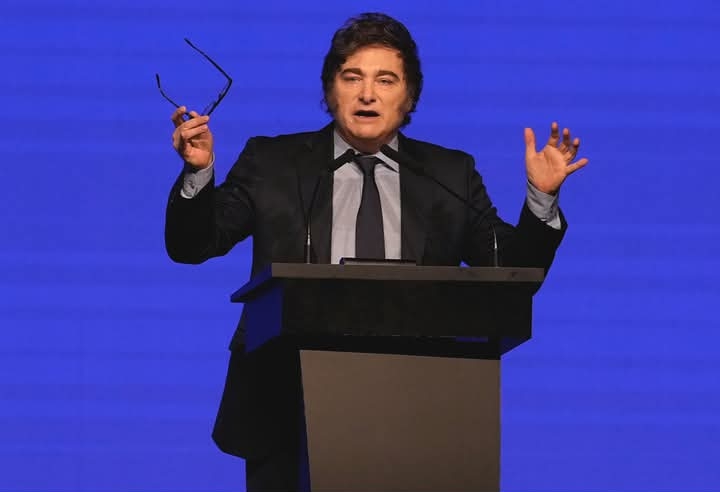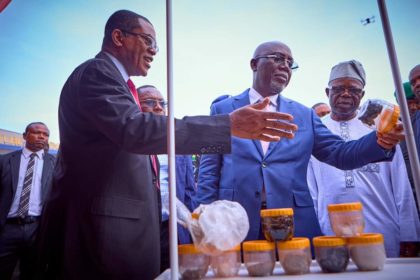
By Adeyemi Adekunle
Less than a month of United States notifying of quitting global health organization, World Health Organization(WHO) Argentina has announced its withdrawal. With President Javier Milei citing “profound differences” with the U.N. agency, particularly over its handling of the COVID-19 pandemic. The decision, which was confirmed by presidential spokesperson Manuel Adorni during a press conference in Buenos Aires on Wednesday, echoes the actions of U.S. President Donald Trump, who initiated the process of pulling the United States out of the WHO on his first day back in office.
Argentina’s move comes as a direct challenge to the global health body, which has been instrumental in coordinating international responses to public health crises, including the ongoing COVID-19 pandemic. Adorni argued that WHO guidelines during the pandemic led to the “largest shutdown in the history of mankind,” a policy that he said inflicted severe economic and social damage on Argentina and other countries around the world. This criticism is part of a broader narrative embraced by Milei and his government, which has consistently expressed dissatisfaction with multilateral institutions, preferring a more isolationist approach to global governance.
The Argentine government has long been critical of the WHO’s pandemic response, particularly its endorsement of stringent lockdown measures and its delay in addressing key issues like travel restrictions and the origin of the virus. While the WHO’s guidelines were widely followed by governments around the world, the Milei administration has argued that the economic costs of these policies were disproportionately borne by developing countries like Argentina. In addition, the government has pointed to the WHO’s focus on global solidarity and international cooperation as a factor that limited Argentina’s ability to pursue its own health strategies independently.
In a statement, Adorni emphasized that the decision was driven by Argentina’s desire to regain control over its own health policies and to avoid what the government views as overly prescriptive international health standards. “We believe that Argentina must chart its own course in health management without the interference of external organizations that fail to understand our unique circumstances,” Adorni said. The spokesperson also noted that the government is committed to strengthening national health systems and exploring alternative international partnerships, rather than relying on the WHO.
This move has sparked immediate reactions from both domestic and international observers. Supporters of the Milei government argue that the WHO’s handling of the pandemic was flawed and that the organization’s policies exacerbated the economic challenges faced by Argentina, which saw its economy shrink dramatically due to lockdown measures. They also view the withdrawal as a bold assertion of national sovereignty, signaling that Argentina will no longer defer to international organizations when it comes to critical domestic issues.
On the other hand, critics of the decision warn that Argentina’s withdrawal from the WHO could have serious consequences for the country’s health infrastructure, particularly in areas like vaccine distribution, disease surveillance, and emergency response. The WHO has been instrumental in coordinating the global rollout of COVID-19 vaccines and in providing technical support to countries facing health crises. Without the WHO’s guidance and resources, Argentina may face difficulties in accessing these critical health services in the future.
In addition, the move raises questions about the potential diplomatic fallout from severing ties with a major international institution. Argentina’s withdrawal from the WHO could isolate the country from future global health initiatives, particularly as the world grapples with ongoing public health challenges, such as emerging infectious diseases, antibiotic resistance, and non-communicable diseases. Furthermore, the decision may strain Argentina’s relations with other countries that continue to rely on the WHO’s expertise and resources.
While the Argentine government has emphasized its commitment to building alternative international partnerships, including strengthening ties with regional organizations and pursuing bilateral agreements with countries like China and Russia, the long-term implications of the WHO withdrawal remain uncertain. It is also unclear how the move will affect the government’s relationship with other multilateral institutions, such as the United Nations and the World Trade Organization, which rely on similar principles of cooperation and shared responsibility.
Argentina’s decision to withdraw from the WHO also highlights the ongoing ideological divide over pandemic policies, which has become a significant point of contention on the global stage. Like Trump’s decision to exit the WHO in 2020, Milei’s move reflects a growing sentiment among certain political leaders that global institutions are overreaching and undermining national sovereignty. This perspective has gained traction in some countries, particularly those that feel their interests have been sidelined in favor of broader global agendas.
However, this approach is far from universally accepted, and many health experts argue that withdrawing from the WHO could weaken Argentina’s ability to respond effectively to future public health crises. As the world continues to face the threat of new diseases, the need for international cooperation and coordinated responses is more important than ever.
Whether Argentina’s decision to break away from the WHO will ultimately prove to be a wise strategy or a dangerous misstep remains to be seen. What is clear, however, is that Milei’s government is determined to take a more independent path, even if it means challenging established global norms and institutions.




